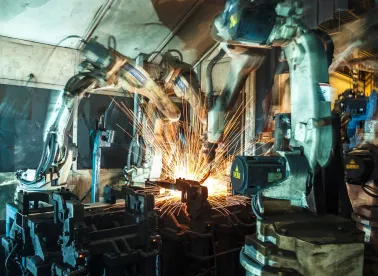On December 14, 2017, the U.S. District Court in Bismarck, North Dakota issued a preliminary injunction preventing the enforcement of recently enacted amendments to the North Dakota Farm Equipment Dealership Statute known as “Senate Bill 2289.” The decision is significant because Senate Bill 2289 is arguably the most restrictive state law affecting franchise and dealer relationships ever enacted. As enacted, Senate Bill 2289 applies only to farm equipment dealership agreements. If it withstands constitutional challenge, however, Senate Bill 2289 could serve as a model for other industry-specific dealer protection statutes and state laws that regulate distribution and franchise relationships generally.
Enacted in the spring of 2017, Senate Bill 2289 was scheduled to become effective on August 1, 2017. On July 25, 2017, however, an industry coalition consisting of the Association of Equipment Manufacturers (“AEM”) and four manufacturers of agricultural equipment that are members of AEM (collectively, the “Manufacturers”)1 filed suit in the U.S. District Court for the District of North Dakota challenging the constitutionality of Senate Bill 2289.2 The original named defendants were the Governor and Attorney General of North Dakota (the “State”). The dealers’ association that had successfully lobbied for Senate Bill 2289’s enactment, the North Dakota Implement Dealers Association (“NDIDA”), sought and obtained the right to intervene as a defendant in support of what it called “one [of] the most comprehensive and impactful pieces of legislation that the NDIDA has ever introduced in our 117 year history.” In addition, the national Equipment Dealers Association and eight of its regional affiliates also filed an amicus brief in defense of the North Dakota statute. After filing suit, the Manufacturers sought preliminary injunctive relief to prevent enforcement of Senate Bill 2289 pending final judgment on the merits. Thereafter, the State agreed not to enforce Senate Bill 2289 until the Manufacturers’ preliminary injunction motion was fully briefed, argued, and decided.
The so-called “Offending Provisions” of Senate Bill 2289 challenged by the Manufacturers, as described more fully in the Complaint,3 include the “No Enforcement of Performance Standards” Provisions whereby the courts of North Dakota could invalidate any performance standards in farm equipment dealer agreements as “unreasonable,” “arbitrary,” or “unfair.” Certain types of dealer performance standards are singled out in Senate Bill 2289 for even more restrictive regulations. Dealership appearance standards and location requirements are among those specifically targeted. Senate Bill 2289’s “No Enforcement of Appearance Standards” Provision prevents manufacturers from requiring the dealer to “unreasonably remodel, renovate, or recondition the dealer’s facilities, change the location of the facilities, or make unreasonable alterations to the dealership facilities.” The statute does not define what is “unreasonable”—except to say that it is automatically unreasonable to require any change within seven years of a dealer’s most recent facility remodel, renovation, or reconditioning.
Senate Bill 2289 also contains provisions that prohibit manufacturers whose trademarks are licensed to farm equipment dealers from requiring a dealer to focus on the products bearing the trademark used to identify the dealership. Besides prohibiting exclusivity provisions in farm equipment dealer agreements, Senate Bill 2289 prohibits requiring farm equipment dealers to stock and display any quantity of equipment and parts supplied by the manufacturer whose trademark identifies the dealership or to have separate facilities, display areas, and personnel for the sale of competing products.4 In the words of one of the sponsors of Senate Bill 2289: “If there’s a building and it says ‘John Deere’ on it, now they (could) sell anything out of that particular building.” As the Manufacturers later observed in support of their preliminary injunction motion:
If S.B. 2289 applied to McDonald’s, the iconic hamburger chain would lose the ability to require its North Dakota franchisees to actually sell any of McDonald’s signature items like the Big Mac® or Happy Meal.® Instead, McDonald’s franchised restaurants across North Dakota could sell, for example, the Burger King Whopper,® the Taco Bell Crunchwrap Supreme,® or the Starbucks Frappuccino.®
Other provisions of Senate Bill 2289 challenged by the Manufacturers include the:
-
“Forced Transfer of Trademark License” Provision, which permits a dealer to transfer its dealer agreement (including the license to use the manufacturer’s trademark) so long as the transferee meets the manufacturer’s “written, reasonable, and uniformly applied standards of qualification,” which are limited to the proposed transferee’s “financial qualifications and business experience;”
-
“No Control Over Dealer Location” Provision, which restricts a manufacturer’s right to remove a dealer’s authorization to operate at a location where it is currently operating and also prohibits requiring dealer to change the location of its facilities and “unreasonably” preventing a dealer from relocating to another suite within its relevant market area;
-
“Enabling Warranty and Incentive Payment Fraud” Provision, which prohibits a manufacturer from conducting a warranty or incentive audit or seeking a charge-back on a warranty or incentive payment more than one year after the date of the warranty or incentive payment, while also prohibiting any charge-back unless the manufacturer can prove that the dealer’s claim was false or fraudulent, or that the dealer did not substantially comply with the “reasonable” written procedures of the manufacturer;
-
“Retroactive Impairment of Existing Warranties” Provision, which expressly applies to pre-existing contracts and requires farm equipment manufacturers to reimburse dealers for labor, diagnostic, transportation, and travel costs incurred in performing warranty service;
-
“No Arbitration” Provision, which prohibits the enforcement of arbitration clauses in farm equipment dealership agreements and specifically prohibits the enforcement of agreements to arbitrate outside North Dakota;
-
“No Market Withdrawal” Provision, which defines a “substantial change” in competitive circumstances to include “the unreasonable removal of a product line or segment;” and
-
“Retroactive Impairment of Existing Contracts” Provision, which makes each of the provisions of Senate Bill 2289 applicable retroactively “notwithstanding the terms of any contract.”
Of the various constitutional and statutory bases for the Manufacturer’s challenge to Senate Bill 2289, only three were specifically briefed at the preliminary injunction stage. The first was the Manufacturers’ claim that Senate Bill 2289 violates the Contracts Clause of the U.S. Constitution because it substantially impairs existing contracts and serves no legitimate public purpose. The second was that Senate Bill 2289 violates the Supremacy Clause of the U.S. Constitution because of inconsistency with the Federal Arbitration Act, 9 U.S.C. § 1 et seq. The third was that, under the Supremacy Clause, Senate Bill 2289 is preempted because it deprives the Manufacturers of their rights under the Trademark Act of 1946, 15 U.S.C. § 1051 et seq. (the “Lanham Act”).
With respect to each of the necessary elements for preliminary injunctive relief—the most important of which is likelihood of success on the merits—the District Court found that the Manufacturers had met their burden of proof. The court found that Senate Bill 2289 “is special interest legislation unsupported by a legitimate public interest which clearly violates the Contracts Clause because it impairs pre-existing contracts.” The court also found “as a matter of law that because SB 2289 prohibits arbitration clauses altogether and also requires that arbitrations be held in North Dakota, it is unquestionably preempted by the Federal Arbitration Act.” Having found that the Manufacturers were likely to succeed on the merits of their Contracts Clause and Federal Arbitration Act claims, the court found it unnecessary to address the merits of the Lanham Act claim. Still, the basis on which the court found irreparable harm included the statement that—by impairing the Manufacturers’ trademark rights—Senate Bill 2289 “harms the Plaintiffs’ reputations and customer relationships in ways that are hard to define and which cannot be easily remedied with money damages.”
At this juncture, it is unclear whether the State will appeal the grant of preliminary injunctive relief. What is clear, however, is that the focus of the litigation going forward will be the Manufacturers’ Lanham Act claims. The reason is that a “victory” under the Contracts Clause might still make Senate Bill 2289 applicable to new or even renewed farm equipment dealership agreements in North Dakota. In contrast, the Manufacturers’ Lanham Act preemption argument would invalidate Senate Bill 2289 altogether.
The Manufacturers’ Lanham Act claim is based on the assertion that Section 45 of the Lanham Act expresses congressional intent “to protect registered marks used in interstate commerce from interference by State, or territorial legislation.” 15 U.S.C. § 1127. The Manufacturers cite authority that Section 45 of the Lanham Act permits the Manufacturers to control the quality of goods and services provided by North Dakota farm equipment dealers that have been licensed to use the Manufacturers’ trademarks to identify their dealerships. Based on such authority, the Manufacturers assert that Senate Bill 2289 is preempted by the Lanham Act because it deprives the Manufacturers of their right to control the appearance, performance, level of service, and other aspects of North Dakota farm equipment dealerships identified with their trademarks.
The legal team representing the Manufacturers in North Dakota is led by Michael J. Lockerby, a partner in the Washington, D.C. office of Foley & Lardner LLP who is national co-chair of the firm’s Distribution & Franchise Practice Group, and Benjamin R. Dryden, senior counsel, who is also resident in Foley’s Washington, D.C. office. Other members of the Foley team include associate Connor A. Sabatino in Foley’s office in Madison, Wisconsin and associates Lauren A. Champaign, and Jarren Ginsburg in the Washington, D.C. office. The firm’s co-counsel in Bismarck is Timothy Q. Purdon, former U.S. Attorney for the District of North Dakota.
1 The individual manufactures named as plaintiffs are AGCO Corporation, CNH Industrial America LLC (the manufacturer of Case IH and New Holland agricultural equipment), Deere & Company (a/k/a John Deere), and Kubota Tractor Corporation.
2 The Complaint and other court papers in the case of Association of Equipment Manufacturers, et al. v. Burgum, et al., Case 1:17-cv-00151-DLH-CSM, are posted on the Distribution & Franchise Practice Group website ([hyperlink]) and on the AEM members-only distribution law compliance website, FoleyDistributionLink.com.
3 A copy of the Complaint is available at www.foley.com/files/uploads/Distrubtion%20&%20Franchise/2017.07.24%20[001]%20Complaint.pdf.
4 These provisions of Senate Bill 2289 are referred to in the Complaint as the “No Exclusivity Requirements,” “No Minimum Inventory or Order Requirements,” and “No Required Separation of Trademarks” Provisions.





 />i
/>i

